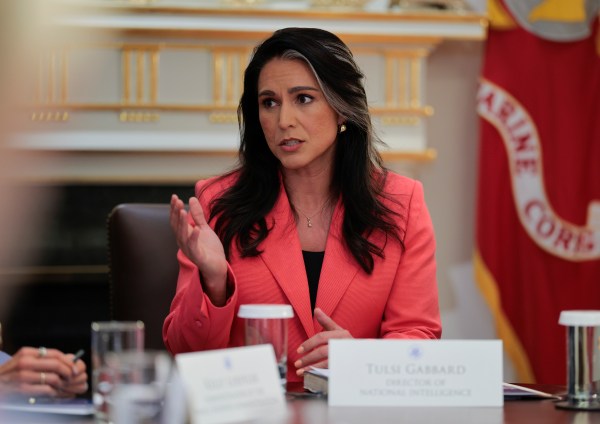There’s a lot of brouhaha over Original Sin.
No, not that original sin. I’m talking about the book by Jake Tapper and Alex Thompson.
But let’s talk about the OG original sin, just for a second. The New York Times review of the book begins:
In Christian theology, original sin begins with Adam and Eve eating the forbidden fruit from the tree of knowledge. But Jake Tapper and Alex Thompson’s “Original Sin” chronicles a different fall from grace. The cover image is a black-and-white portrait of Joe Biden with a pair of hands clamped over his eyes. The biblical story is about the danger of innocent curiosity; the story in this new book is about the danger of willful ignorance.
Just for the record, “innocent curiosity” is not what the biblical story of original sin, never mind the Christian doctrine of original sin, is about. In the Jewish interpretation (i.e., the dominant interpretation until the Christian sequel to the Hebrew Bible created the need to call Book 1 “the Old Testament”), it’s a story of defiance of God’s will, hubris, the trouble our free will can get us into, and—alas—how women can get dudes into trouble. The Christian version of original sin involves a lot of that stuff, but it also introduces the idea that ever since the expulsion from Eden, all humans are born sinful and therefore in need of redemption. Man is “fallen” and all that. I am open to correction, but neither tradition condemns “innocent curiosity.” St. Augustine and, later, St. Thomas Aquinas do lay out a sinful form of curiosity and hence the sin of “curiositas.” But the whole point is that some forms of curiosity—particularly the kind motivated by a talking serpent who says you’ll become God-like if you eat an apple in defiance of God’s instructions—are not, in fact, innocent.
This is kind of relevant. If you forgive the bias, I am fairly confident that the editors of The Dispatch would have caught this assertion and said to the reviewer, “Eh, you might want to reword that, because it’s not quite right.” The (relevant) editors at the New York Times? Clearly not. At least not this time. (This is not to say our editors aren’t infallible, but we have a pretty serious religion desk here, and that’s the kind of thing Michael Reneau lives to take out his red pen on. I’m sure I could sneak some mistakes past them on, say, the plot lines of Barney Miller.)
I think this is amusing, but it’s also an example of the trouble news outlets get into when their internal culture is too ideologically (or politically, or theologically, or culturally) homogeneous. It’s also the kind of thing that can happen when your readers are homogeneous, too.
Which brings me to the brouhaha over the book, Original Sin: President Biden’s Decline, Its Cover-Up, and His Disastrous Choice to Run Again. I’m only a couple of chapters in, but so far, it’s pretty great.
One of the reasons there is such a brouhaha is that the actual subject of the book, Biden’s infirmity and incapacity to run for or serve as president again, isn’t controversial. At least not anymore. Sure, when Biden was still president, it was the subject of intense partisan controversy, at least on TV and in the pages of outlets like the New York Times and the Washington Post. But now? The number of people who still believe that Biden was up to it is tiny. If you subtract people named Biden or aides who were part of the “cover-up,” that number approaches zero.
So now the main controversy, at least on the right, is whether—or to what extent—“the media” was part of the cover-up. A sub-controversy is whether Tapper, a friend and CNN colleague, is a hypocrite for writing a book about a cover-up the critics claim he was part of. His co-author—Alex Thompson, an excellent reporter at Axios—was at the forefront of the Biden-is-too-old beat, so he’s been largely exempt from blame. But Tapper has been turned, very unfairly in my opinion, into an avatar of “the media” by right-wing critics, so he’s getting the brunt of this stuff.
Let’s start with the main charge. Of course, if by “the media” you mean the “lamestream media” or whatever pejorative you use for the media outlets you consider too liberal or in bed with the Democratic Party, there’s ample evidence to support a weaker, but still valid, claim that many in the non-conservative “elite” media were indefensibly dismissive of the question of Biden’s fitness.
That was certainly my view before starting this “news”letter—and it still is. But it’s funny, I went looking for a few examples to back up my view, and I found stuff. But most of it was overly credulous reporting of White House claims or a lot of Trump-is-old-too stuff. Then I found this write-up by the Media Research Center (MRC), which heaps scorn on an episode of PBS’ Washington Week with The Atlantic from September 1, 2023.
The panel, hosted by Jeffrey Goldberg of The Atlantic, featured the cream of the elite media: Mark Leibovich, also of The Atlantic; Kyle Cheney of Politico; Susan Page of USA Today; and Asma Khalid of NPR. From the MRC post:
While the panel did address the important matter of the gerontocracy currently running the country, several of the panelists seemed to think Republican mockery of Biden for his age and infirmity had no basis in fact. Politico’s Kyle Cheney set the table, bemoaning such questions about Biden’s age could be “driven” by “Republicans on the other side” who “have spent four years almost kind of weaponizing Biden's age against him.”
Asma Khalid of taxpayer-funded NPR rushed to his defense as well, insisting “you don’t see” those issues “in the poll numbers” (which is absurd) and Goldberg, having seen no reason to disagree, asked, “why is that?”
That’s gold! The only problem? If you look at the actual transcript, it turns out the whole discussion was predicated on how Biden’s age was a problem. Leibovich talked about how “the massive poll numbers against Biden [are] largely because of his age and the age itself.” And talking about his age is “very, very messy.”
Khalid’s statement about how “you don’t see [the age issue] in the poll numbers” was in reference to Trump’s age not being an issue, while Biden’s was.
Were the panelists soft on Biden? Yes, I think they were. Did they assume that Republican attacks were unfair and exaggerated? Yes, they did. But then again, many of the Republican or right-wing attacks on Biden were unfair and exaggerated. But many were fair and on point. Jeffrey Goldberg said Biden was “quite acute.” I think that’s an exaggeration going the other way, or maybe wishcasting, or maybe he had experiences with Biden that made it seem plausible. Opinions will differ on what counts as fair game, particularly in an election year. So sure, Leibovich made a defensible claim that Biden wasn’t the drooling, animated corpse some Republicans alleged.
Indeed, Leibovich conceded that Biden’s age was a problem. Khalid pointed out how Biden was heavily managed and couldn’t do press conferences.
It would be weird if Khalid was actually claiming that concern with Biden’s age wasn’t showing up in the polls, because it had been a huge issue in polls going back more than a year. Just days earlier, the Associated Press published a piece on its latest poll. “Americans actually agree on something in this time of raw discord: Joe Biden is too old to be an effective president in a second term,” it began. “Only a few years his junior, Donald Trump raises strikingly less concern about his age.” The AP-NORC poll found that 69 percent of Democrats said the phrase “too old to be an effective president” described Biden at least “somewhat well.” On May 8, 2023, the Washington Post ran a story titled “Biden’s mental sharpness polling decline” with a subtitle reading, “It’s not just the new Washington Post-ABC News poll. This is a liability — and on an issue that was a wash in 2020.”
It’s simply a fact that polling in 2022 and 2023 found, over and over again, that Americans were concerned about Biden’s age. In November of 2022, nearly 4 in 10 Democrats in a YouGov survey said his age was making it difficult for him to do the job.
Shadows on the Wall
So what’s the point of all this? Well, for starters, the current kerfuffle about Original Sin and the media’s complicity in the coverup isn’t a new argument. The claim was made—constantly, in real time—when Biden was president, and well before his disastrous June 2024 debate. Indeed, that was why the “We finally beat Medicare” fiasco was so significant. His debate performance wasn’t a revelation to most Americans or people in the media; it was a confirmation (as Cathy Young documented last year when the right went berserk with “cover-up” claims after the debate). I mean, Biden had a primary opponent, Dean Phillips, who ran against him explicitly on the issue of his age. Saturday Night Live mocked Biden’s age. CNN ran stories on his age-related difficulties in June 2022, and Jake Tapper brought it up plenty. And, again, Alex Thompson—then at Politico—was writing about it all the time.
Is it true that people in “the media” ran cover for Biden? Of course. Joe Scarborough heaped ridicule and scorn on anyone who raised concerns about Biden’s fitness. But Scarborough isn’t a reporter. And neither are most of the other usual suspects who host MSNBC shows. Is it true that the White House worked the refs constantly? Absolutely. That’s part of what Original Sin is about. That’s also the story of Jonathan Allen and Amie Parnes’ book, Fight: Inside the Wildest Battle for the White House. (We talked about it on The Remnant.)
But there’s a larger point to be made here. An enormous number of people get their news and “news” from either a single source or a single kind of source. In 2014, Pew found that nearly half (47 percent) of all self-described “consistent conservatives” rely on Fox News alone as their main source of news (and 88 percent said they trusted it). Consistent liberals followed more sources, like NPR, the New York Times, etc. But I put it to you that if you’re getting your news from the NPR/New York Times/Washington Post/BBC basket, you’re not getting a lot of diverse perspectives, you’re getting largely the same perspective reinforced by different outlets. It’s an old study, I know. But subsequent studies show the problem intensifying. Indeed, large numbers of Americans today get their news from social media, and the fan service required by those platforms’ algorithms makes the audience capture problem of cable news seem almost quaint by comparison.
If all you know about CNN or even MSNBC comes from Fox News clips, write-ups by the Media Research Center (a major source for such clips for Fox producers), or selectively edited videos on Twitter from right-wingers, you’re not getting an accurate view of those networks’ coverage. You’re getting a partisan view of what Fox, MRC, and right-wing Twitter influencers want you to think of those networks’ coverage. The same goes in reverse. Sure, Fox News guests and anchors say plenty of ridiculous things, now more than ever. But there’s plenty of really good news coverage and analysis over there, too. But why would Rachel Maddow highlight a sober report that makes Fox look sane? Why would Jesse Watters or Sean Hannity show a clip of Tapper grilling Biden about his age problems? That would only serve to mess up the narrative.
As Claire Lehmann wrote for The Dispatch last week, a lot of the stupider fights in politics these days are a function of the fact that we live in a post-literate age, where people form their opinions based on video snippets and risible social media posts. It’s easy to think the other side is idiotic, venal, or demonic if your only source of information is people who have a vested interest in you thinking that.
But let’s get back to the cover-up. It’s fine to argue that much of the mainstream media wasn’t aggressive enough or wasn’t aggressive enough early enough to make a difference. I still think that’s true, generally speaking. But that’s a weaker claim than “the media was in on it.” Again, sure, some in the media were in on it. That has always, and will always, be true. But, as I pointed out after the Biden-Trump debate, even if you buy the strongest version of the media-was-in-on-it charge, the unavoidable fact is that most Americans—nay, most Democrats—didn’t buy it.
There is this amazing cognitive dissonance running through an enormous amount of right-wing media criticism. On the one hand, you often hear that the legacy media doesn’t matter! It’s irrelevant! America has moved on from these dying, calcified elites with low ratings! On the other hand, any time Trump or the GOP is on the wrong side of an issue, it’s the mainstream media’s fault! And it’s “fake news!” Pick a lane.
The flip side to this problem: The mainstream media thinks it’s more powerful—or should be —than it actually is. This leads to what you might call the Spider-Man complex: “With great power comes great responsibility.” As a result, many in the media think covering facts that create problems for their preferred narratives and political outcomes is perilous. As CNN’s Hadas Gold wrote in July 2024, “It can be tricky to report on something as difficult to define as a person aging, when his opponent is a convicted felon, who regularly lies and has threatened to use the government to go after his political opponents.” I agree that it’s tricky to define age-related problems because people age differently—Bernie Sanders is the socialist Methuselah, and Donald Trump will be 79 next month. But Biden’s age problems are entirely independent of the fact that Trump is, in fact, a lying, vindictive felon.
Now, if you’re nodding along at that, fine. But the phenomenon I just described doesn’t only apply to the New York Times or MSNBC. It applies to Fox News and a lot of right-wing media as well. Fox is, by any objective nonpartisan metric, the mainstream media, too. And it lost three quarters of a billion dollars in a lawsuit, because it was too scared to full-throatedly call b.s. on Trump’s stolen election lies (even though, yes, the news side covered those lies accurately, something you might have missed if you only followed the left’s coverage of Fox).
Fallen
Let’s circle back. The story of original sin, and Original Sin, share some things in common. Don’t worry, I won’t get all exegetical on you. But for starters, Eve gave really bad advice to her guy, and Jill Biden gave terrible advice to hers. More seriously, one of the morals of the story is that people can—but shouldn’t—choose to decide what is good and bad (or evil) based on their own interests, desires, or judgment. The doctrine of original sin involves rejecting the authority of God, or if you prefer, an understanding of right and wrong, in order to become the master not just of your own fate, but of events. It involves the idea that through a mere act of human will, you can ignore the Good or the Right to be the Creator in your own tale.
That’s what Joe Biden and his entourage did. They rejected reality—and doing the right thing—for the sake of their own egos and proximity to power. And that’s what some in the media did, too—either for Joe Biden or against Donald Trump. That’s also what some in the media do every day for Donald Trump. You know why? Because fallenness isn’t a right-wing or left-wing problem. It is the condition of man. And it takes work to do the right thing when it matters, particularly when everyone on your team insists that the right thing is what’s good for your team.







Please note that we at The Dispatch hold ourselves, our work, and our commenters to a higher standard than other places on the internet. We welcome comments that foster genuine debate or discussion—including comments critical of us or our work—but responses that include ad hominem attacks on fellow Dispatch members or are intended to stoke fear and anger may be moderated.
With your membership, you only have the ability to comment on The Morning Dispatch articles. Consider upgrading to join the conversation everywhere.